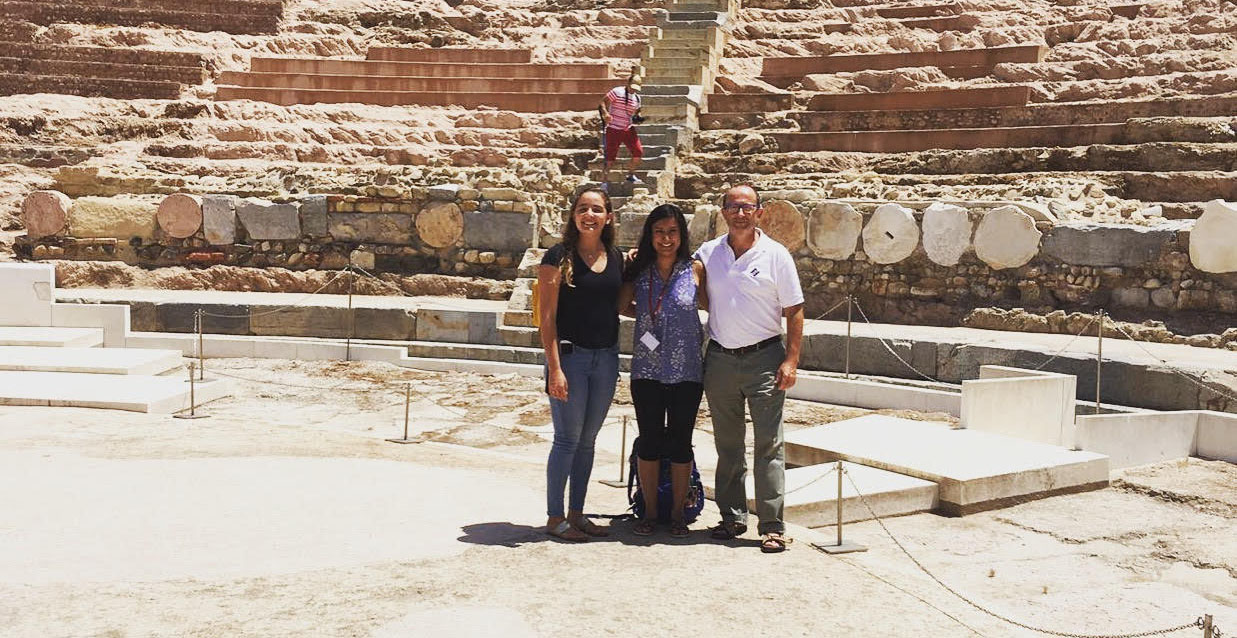Two recent MPH alumni of the George Washington University Milken Institute School of Public Health were among the ten students selected from hundreds of applicants for research fellowships during the summer through a program called The Mt. Sinai International Exchange Program for Minority Students. El'gin Avila (Environmental Health Science and Policy MPH ’17) spent his summer in Dublin, Ireland, and Brenda Trejo (Global Environmental Health MPH ’17) was based in Murcia, Spain; both left soon after receiving their degrees from the Department of Environmental and Occupational Health.
The Mt. Sinai International Exchange Program for Minority Students program is administered by the Icahn School of Medicine at Mt. Sinai in New York City. The program is funded by the National Center on Minority Health and Health Disparities and seeks to give minorities underrepresented in the sciences the opportunity to engage in international mentored research.
Avila was placed in Dublin, Ireland, where he worked on a wetlab research project with a radiation therapy team at Trinity College Dublin. “I learned techniques such as Western blotting, clonogenics, cell culturing, and I also did some microscopy work as well,” Avila says. His main project focused on inhibitors of the poly (ADP-ribose) polymerase 1 (PARP1) enzyme, which are considered to be promising molecular targets for the discovery of anti-tumor drugs. “We wanted to see how these antibiotics affected our cell lines in order for the team to develop new projects,” he explains.
While at Trinity College, Avila also conducted a systematic review on hyperbaric oxygen therapy treatment to investigate the impacts of pre-radiation exposure to a highly pressurized 100% oxygen content-environment. “We wanted to see whether or not, and if so to what degree, the exposure would increase effectiveness of the radiation therapy,” Avila says. He also assisted a faculty member with a minor portion of her project cross-checking a survey for health literacy and some data management updates.
Trejo was based in the Murcia, Spain, which is located in the southeastern part of the country. There, she performed mentored research with Dr. Juan Antonio Ortega Garcia, director of the Pediatric Environmental Health Specialty Unit Murcia-Valencia at the Hospital Universitario Virgen de la Arriaxaca. The department is well-known because it was awarded the Best-Practice Pan-European Children’s Health & Environment award by the World Health Organization in 2007.
Trejo updated a geospatial database for the study Programa de Largo Seguimiento de Supervivientes de Cancer Pediatrico en la Region de Murcia (PLASESCAP-MUR, which translates as the Long-term Follow up of Childhood Cancer Survivors in the Murcia Region). “I helped collect the pediatric environmental history of childhood cancer survivors and mapped the incidence and geographic distribution of pediatric cancer,” Trejo says. “Integration of the pediatric environmental history and mapping assists in identifying space-time clusters through an environmental monitoring system to understand associated risk factors,” she explains.
Collecting data to research a case-series of a pediatric non-Hodgkins lymphoma cluster in nearby Cartagena, on the Mediterranean coast, was another of Trejo’s projects. (She and some of her colleagues also took advantage of the opporunity to visit a Roman amphitheater in Cartagena, as shown in the photo above.) “This entailed medical extraction to understand the pediatric environmental history and clinical history of the survivors with an emphasis on epigenetics including qualitative and quantitative data collection,” she says.
Both Avila and Trejo say that their education at GW prepared them well for their fellowships. “I think our GW EOH department's coursework and working as Professor Ami Zota’s research assistant prepared me well for this opportunity, I'm definitely very thankful for everyone's support,” Trejo says.
Avila adds that GW also prepared him well for his current studies at working towards his PhD at the University of Arizona. “The faculty at Milken is top-notch. They helped me develop my methodology for critical thinking and encouraged me to think big when it came to research and science,” he says.
Learn more about the fellowships and applying for them here


